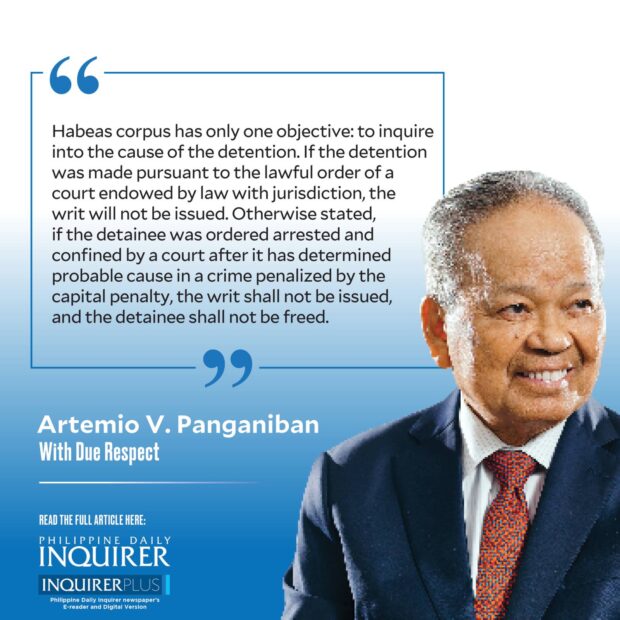Writ of habeas corpus
 Traditionally, the writ of habeas corpus is an order issued by a court directing a person detaining another to produce the physical body of the detainee at a designated time and place, and to explain the reason for the detention.
Traditionally, the writ of habeas corpus is an order issued by a court directing a person detaining another to produce the physical body of the detainee at a designated time and place, and to explain the reason for the detention.
HABEAS CORPUS HAS ONLY ONE OBJECTIVE: to inquire into the cause of the detention. If the detention was made pursuant to the lawful order of a court endowed by law with jurisdiction, the writ will not be issued. Otherwise stated, if the detainee was ordered arrested and confined by a court after it has determined probable cause in a crime penalized by the capital penalty, the writ shall not be issued, and the detainee shall not be freed.
However, in Reyes v. Director (Jan. 17, 2023), the First Division of the Supreme Court issued the writ directing the warden of the Taguig City Jail to release Jessica Lucila “Gigi” Reyes from detention though her detention was caused by an order of the Sandiganbayan after a charge of plunder was filed and probable cause had been determined.
Her release was not absolute; it was subjected to four conditions: She shall (1) attend personally the hearings of the pending cases against her; (2) submit quarterly reports to the Sandiganbayan (SBN) of her whereabouts; (3) secure authority from the SBN in case she travels abroad and submit a report of her return within five days from her arrival; and (4) submit to the Supreme Court a quarterly report of her compliance with the three preceding conditions.
Though the Court acknowledged that the writ should not be issued when the detention is caused by a valid order, it nonetheless freed Gigi Reyes, as an exception, because her custody has become “vexatious, capricious, and oppressive, amounting to an infringement on the constitutional right to speedy trial.”
IN FORMULATING THE EXCEPTION, the Supreme Court freed Gigi Reyes (1) without requiring a bond; (2) contrary to settled jurisprudence that the release should be unconditional and absolute because the writ is premised on lack of jurisdiction due to a violation of constitutional rights that voids all proceedings, meaning, the accused should be acquitted pronto; (3) contrary to Section 4, Rule 102 of the Rules of Court stating that the writ should not be allowed when the accused “is in the custody of an officer under process issued by a court or judge … (who) had jurisdiction …”; thus, the filing against her of plunder charges amounting to over P172 million validated her detention; (4) contrary to the constitutional provision that persons accused of capital offenses can be released only if the prosecution’s evidence is “not strong”; and (5) contrary to the rule that habeas corpus cannot be allowed when the application for bail had already been denied, as in the case of Gigi.
Moreover, the release order appears to deprive the prosecutors and the government of due process because they were not impleaded as parties to, never notified of, and denied the chance to oppose, Gigi’s petition for habeas corpus; yet they were ruled to have violated her right to speedy trial.
It also seems to contradict the Internal Rules of the Supreme Court (IRSC) because the release order was made merely via an “unsigned resolution” (UR), signed only by the Division Clerk of Court. Under the IRSC, a decision or resolution disposing of a case should bear the “signatures of the Members who took part in the deliberations,” an “attestation by the Division Chairman,” and a “Certification by the Chief Justice,” all of which the UR did not have. Decisions and resolutions with the three requirements of signatures, attestation, and certification are published in the Official Gazette for the official information of all. But not URs.
Under the IRSC, a UR that “disposes of the case on the merits [like Gigi’s] … is essentially meaningful only to the parties; has no significant doctrinal value …,” does not constitute a precedent, and binds only the parties to the case.
FOR THESE REASONS AND MORE, Solicitor General Menardo I. Guevarra and his team filed last Feb. 3 a little-known but, I think, formidable “Omnibus Motion” (OM) of the UR freeing Gigi. To the best of my knowledge, the Court has not acted on this MR.
Despite the well-reasoned OM, the Gigi exception—IMHO—should be applied (unless reversed or modified) in the spirit of fairness to future cases that are on all fours and in pari materia with her allegations that: (1) she had been detained for almost nine years; (2) and her trial commenced only on March 3, 2022; (3) relative to an “Information” filed on June 5, 2014; (4) yet, the proceedings were delayed due to wrong markings of the prosecution’s documentary evidence; (5) and due to the issuance by the SBN of two confusing pretrial orders; (6) while the SBN allowed only one witness per day despite the trial being scheduled twice a week; (7) with thousands of exhibits to be passed upon; and (8) the prosecution failed to provide “reasons or justifications for the long-drawn-out proceedings.”
How will the Court decide the SolGen’s OM? Despite the denial of her bail plea, will Leila de Lima’s planned petition for habeas corpus succeed? Abangan!
Comments to chiefjusticepanganiban@hotmail.com




















